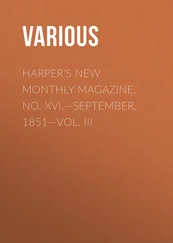Various - Harper's New Monthly Magazine, No. XXIV, May 1852, Vol. IV
Здесь есть возможность читать онлайн «Various - Harper's New Monthly Magazine, No. XXIV, May 1852, Vol. IV» — ознакомительный отрывок электронной книги совершенно бесплатно, а после прочтения отрывка купить полную версию. В некоторых случаях можно слушать аудио, скачать через торрент в формате fb2 и присутствует краткое содержание. Издательство: Иностранный паблик, Жанр: periodic, foreign_edu, на английском языке. Описание произведения, (предисловие) а так же отзывы посетителей доступны на портале библиотеки ЛибКат.
- Название:Harper's New Monthly Magazine, No. XXIV, May 1852, Vol. IV
- Автор:
- Издательство:Иностранный паблик
- Жанр:
- Год:неизвестен
- ISBN:нет данных
- Рейтинг книги:4 / 5. Голосов: 1
-
Избранное:Добавить в избранное
- Отзывы:
-
Ваша оценка:
- 80
- 1
- 2
- 3
- 4
- 5
Harper's New Monthly Magazine, No. XXIV, May 1852, Vol. IV: краткое содержание, описание и аннотация
Предлагаем к чтению аннотацию, описание, краткое содержание или предисловие (зависит от того, что написал сам автор книги «Harper's New Monthly Magazine, No. XXIV, May 1852, Vol. IV»). Если вы не нашли необходимую информацию о книге — напишите в комментариях, мы постараемся отыскать её.
Harper's New Monthly Magazine, No. XXIV, May 1852, Vol. IV — читать онлайн ознакомительный отрывок
Ниже представлен текст книги, разбитый по страницам. Система сохранения места последней прочитанной страницы, позволяет с удобством читать онлайн бесплатно книгу «Harper's New Monthly Magazine, No. XXIV, May 1852, Vol. IV», без необходимости каждый раз заново искать на чём Вы остановились. Поставьте закладку, и сможете в любой момент перейти на страницу, на которой закончили чтение.
Интервал:
Закладка:
"I hope he is writing to his mother," said Antonio to himself, "to confess his faults and promise to be a good boy."
The next morning Antonio rose pretty early, but he moved softly about the room, so as not to disturb Rodolphus, who he supposed was asleep, as his room was still. Antonio went down and ordered breakfast, and attended to his horses, and by-and-by he came up again to see if Rodolphus had got up. He listened at the door, and all was still. He then opened the door gently and looked in. There was nobody there, and to Antonio's great surprise, the bed was smooth and full, as if had not been disturbed.
Antonio went in. He saw a paper lying on the table with his own name on the outside of it. He took this paper up, and found that it was in Rodolphus's handwriting. It was half in written, and half in printed characters, and very badly spelled. The substance of it was this.
"Antonio,
"I am sorry to go off and leave you, but I must. I should be glad to go and live at my uncle's, but I can't. Don't try to find out where I have gone. Give my love to my mother and to Ellen. I had not any money, and so I had to take your half dollars out of your pocket. If I ever can, I shall pay you.
"Rodolphus."P.S. It's no use in me trying to be a good boy."
Antonio made diligent inquiry for Rodolphus, in the town where he disappeared, and in all the surrounding region, but no trace of the fugitive could be found. He finally gave up the search and went mournfully home.
NAPOLEON BONAPARTE
France had tried republicanism, and the experiment had failed. There was neither intelligence nor virtue among the people, sufficient to enable them to govern themselves. During long ages of oppression they had sunk into an abyss, from whence they could not rise, in a day, to the dignity of freemen. Not one in thirty of the population of France could either read or write. Religion and all its restraints, were scouted as fanaticism. Few had any idea of the sacredness of a vote, of the duty of the minority good-naturedly to yield to the majority. It is this sentiment which is the political salvation of the United States. Not unfrequently, when hundreds of thousands of ballots have been cast, has a governor of a State been chosen by the majority of a single vote. And the minority, in such circumstances, have yielded just as cordially as they would have done to a majority of tens of thousands. After our most exciting presidential elections, the announcement of the result is the harbinger of immediate peace and good-natured acquiescence all over the land. The defeated voter politely congratulates his opponent upon his success. The French seemed to have attained no conception of the sanctity of the decisions of the ballot-box. Government was but a series of revolutions. Physical power alone was recognized. The strongest grasped the helm, and, with the guillotine, confiscation, and exile, endeavored hopelessly to cripple their adversaries. Ten years of such anarchy had wearied the nation. It was in vain to protract the experiment. France longed for repose. Napoleon was the only one capable of giving her repose. The nation called upon him, in the loudest tones which could be uttered, to assume the reins of government, and to restore the dominion of security and order. We can hardly call that man an usurper who does but assume the post which the nation with unanimity entreats him to take. We may say that he was ambitious, that he loved power, that glory was his idol. But if his ambition led him to exalt his country; if the power he loved was the power of elevating the multitude to intelligence, to self-respect, and to comfort; if the glory he sought was the glory of being the most illustrious benefactor earth has ever known, let us not catalogue his name with the sensualists and the despots, who have reared thrones of self-aggrandizement and self-indulgence upon the degradation of the people. We must compare Napoleon with the leaders of armies, the founders of dynasties, and with those who, in the midst of popular commotions, have ascended thrones. When we institute such a comparison, Napoleon stands without a rival, always excepting, in moral worth, our own Washington.
The next morning after the overthrow of the Directory, the three consuls, Napoleon, Sieyes, and Ducos, met in the palace of the Luxembourg. Sieyes was a veteran diplomatist, whose gray hairs entitled him, as he supposed, to the moral supremacy over his colleagues. He thought that Napoleon would be satisfied with the command of the armies, while he would be left to manage the affairs of state. There was one arm-chair in the room. Napoleon very coolly assumed it. Sieyes, much annoyed, rather petulantly exclaimed, "Gentlemen, who shall take the chair?" "Bonaparte surely," said Ducos; "he already has it. He is the only man who can save us." "Very well, gentlemen," said Napoleon, promptly, "let us proceed to business." Sieyes was staggered. But resistance to a will so imperious, and an arm so strong, was useless.
Sieyes loved gold. Napoleon loved only glory. "Do you see," inquired Sieyes, pointing to a sort of cabinet in the room, "that pretty piece of furniture?" Napoleon, whose poetic sensibilities were easily aroused, looked at it with interest, fancying it to be some relic of the disenthroned monarchs of France. Sieyes continued: "I will reveal to you a little secret. We Directors, reflecting that we might go out of office in poverty, which would be a very unbecoming thing, laid aside, from the treasury, a sum to meet that exigence. There are nearly two hundred thousand dollars in that chest. As there are no more Directors, the money belongs to us." Napoleon now began to understand matters. It was not difficult for one who had proudly rejected millions, to look with contempt upon thousands. "Gentlemen," said he, very coolly, "should this transaction come to my knowledge, I shall insist that the whole sum be refunded to the public treasury. But should I not hear of it, and I know nothing of it as yet, you, being two old Directors, can divide the money between you. But you must make haste. Tomorrow it may be too late." They took the hint, and divided the spoil; Sieyes taking the lion's share. Ducos complained to Napoleon of the extortion of his colleague. "Settle the business between yourselves," said Napoleon, "and be quiet. Should the matter come to my ears, you will inevitably lose the whole."
This transaction, of course, gave Napoleon a supremacy which neither of his colleagues could ever again question. The law which decreed the provisional consulship, conferred upon them the power, in connection with the two legislative bodies, of twenty-five members each, of preparing a new Constitution to be submitted to the people. The genius of Napoleon, his energy, his boundless information, and his instinctive insight into the complexities of all subjects were so conspicuous in this first interview, that his colleagues were overwhelmed. That evening Sieyes went to sup with some stern republicans, his intimate friends. "Gentlemen," said he, "the republic is no more. It died to-day. I have this day conversed with a man who is not only a great general, but who is himself capable of every thing, and who knows every thing. He wants no counselors, no assistance. Politics, laws, the art of governing, are as familiar to him as the manner of commanding an army. He is young and determined. The republic is finished." "But," one replied, "if he becomes a tyrant, we must call to our aid the dagger of Brutus." "Alas! my friends," Sieyes rejoined, "we should then fall into the hands of the Bourbons, which would be still worse."
Napoleon now devoted himself, with Herculean energies, to the re-organization of the government, and to the general administration of the affairs of the empire. He worked day and night. He appeared insensible to exhaustion or weariness. Every subject was apparently alike familiar to his mind; banking, police regulations, diplomacy, the army, the navy, every thing which could pertain to the welfare of France was, grasped by his all-comprehensive intellect.
Читать дальшеИнтервал:
Закладка:
Похожие книги на «Harper's New Monthly Magazine, No. XXIV, May 1852, Vol. IV»
Представляем Вашему вниманию похожие книги на «Harper's New Monthly Magazine, No. XXIV, May 1852, Vol. IV» списком для выбора. Мы отобрали схожую по названию и смыслу литературу в надежде предоставить читателям больше вариантов отыскать новые, интересные, ещё непрочитанные произведения.
Обсуждение, отзывы о книге «Harper's New Monthly Magazine, No. XXIV, May 1852, Vol. IV» и просто собственные мнения читателей. Оставьте ваши комментарии, напишите, что Вы думаете о произведении, его смысле или главных героях. Укажите что конкретно понравилось, а что нет, и почему Вы так считаете.












